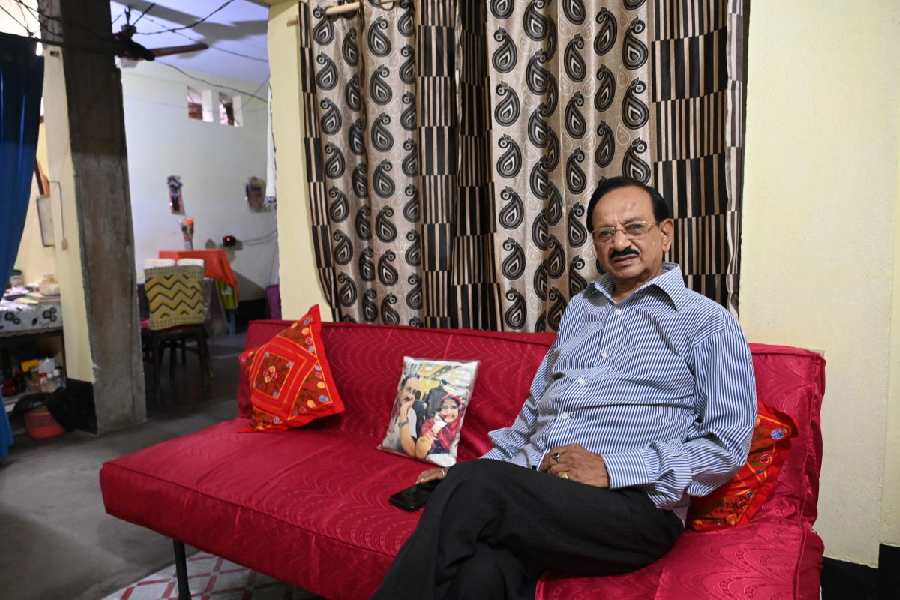Muhammad Yunus — who will take oath on Thursday as the head of the interim government in Bangladesh to be formed after the fall of the Sheikh Hasina regime — has had several important pit stops in his life’s journey and one of those is definitely Burdwan in Bengal.
Burdwan became an important junction in Yunus’s life after the Nobel Peace Prize winner married Burdwan girl Afrozi Begum in 1983.
“The marriage took place in Dhaka. As I was down with typhoid my mother, Sitara Begum, and I could not attend the ceremony. I don’t remember much about my father as he passed away in 1958. So other family members took care of the rituals in our neighbouring country. But they did come to our house in Burdwan after their marriage,” said Ashfaq Hossain, Afrozi’s younger brother, told The Telegraph over the phone from his home in Burdwan’s Laskardighi, which is a stone’s throw from the town’s iconic Curzon Gate.
Asked what led to Afrozi’s marriage to Yunus, a rather shy Ashfaq chuckled and said: “I know for sure that it was an arranged marriage and I was in my late teens. In our times, not much was discussed in our house. My sister is several years older than me. So, it never occurred to me to ask how the two got together. She was a researcher in physics at Manchester University when the marriage took place.”
Afrozi, who studied at the town’s Burdwan Municipal Girls’ High School and later in Raj College, excelled in studies and her academic achievements took her abroad.
Ashfaq said Afrozi, who is not keeping well these days, retired as a professor of physics at Dhaka’s Jahangirnagar University.
Asked when was the last time Yunus and Afrozi visited Burdwan, Ashfaq could not recollect the year but said it was once before and then after winning the Nobel Peace Prize in 2006.
“I am a diabetic and tend to forget things. When he came before winning the Nobel, I wanted to gift him a suit. He refused. When he came after winning the prize, to avoid attention he did not let anyone know about the visit. My mother was alive then. After a short stay, he returned to Dhaka. For his trip from Burdwan to Howrah station, I wanted to book him a first class ticket in an express train. He again refused, and said he wanted to travel second class as that would help him interact with the people. His simplicity always wins our hearts,” said Ashfaq, who is in his sixties.
He recalled how his mother and everyone cried when they saw on television the founder of the micro-credit organisation Grameen Bank being awarded the Nobel Peace Prize.
“We couldn’t hold back our tears. We cried in joy,” said Ashfaq as his voice seemed to choke one more time as he recalled that day. As Bangladesh remains in the grip of violence and Yunus is scheduled to reach Dhaka on Thursday, the one word that was repeated several times during the telephonic conversation with Ashfaq was “peace”.
Apart from wishing lasting peace to return to the “beautiful country in our neighbourhood”, Yunus’s kin living in Burdwan expect the man, whom the coordinators of the Anti-Discrimination Student Movement — a platform that led the movement against Hasina — wants to helm in these turbulent times, to bring the two nations closer to each other.
“Last year one of my sisters passed away in Dhaka. I could not see my sister one last time because of the long-drawn visa process. I would want Yunus bhai to take care of such pains. The process should become easy. I know that it is not a long-term assignment but would want him to address this issue. The long wait for a visa to Bangladesh is particularly painful for senior citizens like me. That should become easier. The two countries should talk and make arrangements for something like a visa on arrival,” Ashfaq said and insisted that his demand should find space in the reportage.
A cardiac patient, Ashfaq visits Bangladesh at least once a year for a check up by his nephew, who is a doctor.
“Afrozi didi has a daughter but the son of my sister, who passed away a year ago, is a doctor. He insists that I visit him for a check-up every year and I do it diligently,” Ashfaq said.
Though he has not spoken with Yunus or his sister, who is too unwell to take a call, Ashfaq hopes to catch up with his kin in Dhaka fast.
“Not sure when we will meet but if all goes well my annual winter trip to Dhaka is still on,” he said.











